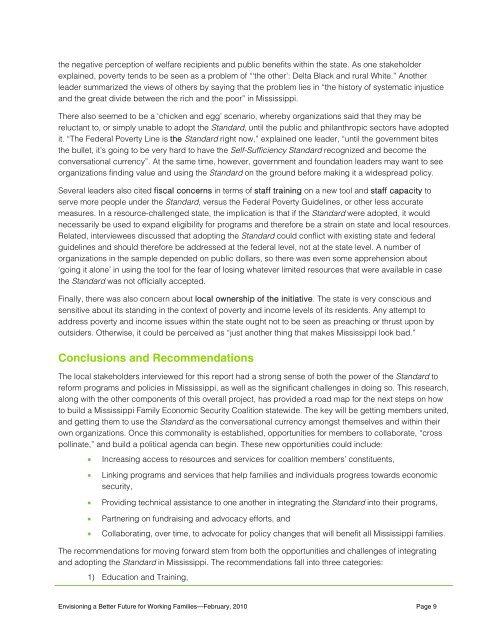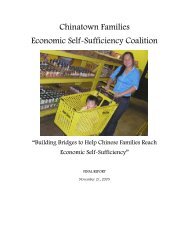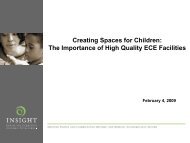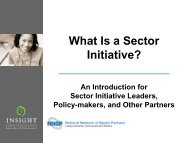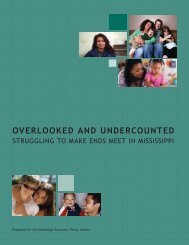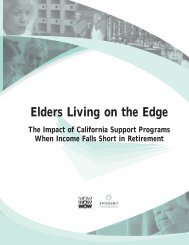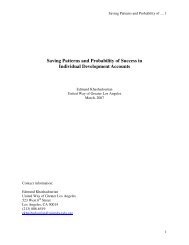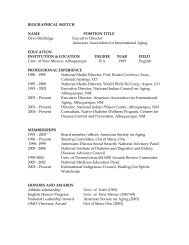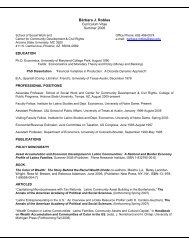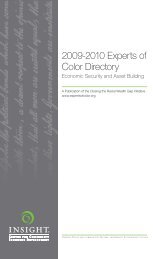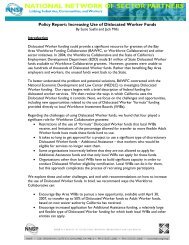Envisioning a Better Future for Working Families in Mississippi
Envisioning a Better Future for Working Families in Mississippi
Envisioning a Better Future for Working Families in Mississippi
Create successful ePaper yourself
Turn your PDF publications into a flip-book with our unique Google optimized e-Paper software.
the negative perception of welfare recipients and public benefits with<strong>in</strong> the state. As one stakeholder<br />
expla<strong>in</strong>ed, poverty tends to be seen as a problem of “‘the other’: Delta Black and rural White.” Another<br />
leader summarized the views of others by say<strong>in</strong>g that the problem lies <strong>in</strong> “the history of systematic <strong>in</strong>justice<br />
and the great divide between the rich and the poor” <strong>in</strong> <strong>Mississippi</strong>.<br />
There also seemed to be a ‘chicken and egg’ scenario, whereby organizations said that they may be<br />
reluctant to, or simply unable to adopt the Standard, until the public and philanthropic sectors have adopted<br />
it. “The Federal Poverty L<strong>in</strong>e is the Standard right now,” expla<strong>in</strong>ed one leader, “until the government bites<br />
the bullet, it’s go<strong>in</strong>g to be very hard to have the Self-Sufficiency Standard recognized and become the<br />
conversational currency”. At the same time, however, government and foundation leaders may want to see<br />
organizations f<strong>in</strong>d<strong>in</strong>g value and us<strong>in</strong>g the Standard on the ground be<strong>for</strong>e mak<strong>in</strong>g it a widespread policy.<br />
Several leaders also cited fiscal concerns <strong>in</strong> terms of staff tra<strong>in</strong><strong>in</strong>g on a new tool and staff capacity to<br />
serve more people under the Standard, versus the Federal Poverty Guidel<strong>in</strong>es, or other less accurate<br />
measures. In a resource-challenged state, the implication is that if the Standard were adopted, it would<br />
necessarily be used to expand eligibility <strong>for</strong> programs and there<strong>for</strong>e be a stra<strong>in</strong> on state and local resources.<br />
Related, <strong>in</strong>terviewees discussed that adopt<strong>in</strong>g the Standard could conflict with exist<strong>in</strong>g state and federal<br />
guidel<strong>in</strong>es and should there<strong>for</strong>e be addressed at the federal level, not at the state level. A number of<br />
organizations <strong>in</strong> the sample depended on public dollars, so there was even some apprehension about<br />
‘go<strong>in</strong>g it alone’ <strong>in</strong> us<strong>in</strong>g the tool <strong>for</strong> the fear of los<strong>in</strong>g whatever limited resources that were available <strong>in</strong> case<br />
the Standard was not officially accepted.<br />
F<strong>in</strong>ally, there was also concern about local ownership of the <strong>in</strong>itiative. The state is very conscious and<br />
sensitive about its stand<strong>in</strong>g <strong>in</strong> the context of poverty and <strong>in</strong>come levels of its residents. Any attempt to<br />
address poverty and <strong>in</strong>come issues with<strong>in</strong> the state ought not to be seen as preach<strong>in</strong>g or thrust upon by<br />
outsiders. Otherwise, it could be perceived as “just another th<strong>in</strong>g that makes <strong>Mississippi</strong> look bad.”<br />
Conclusions and Recommendations<br />
The local stakeholders <strong>in</strong>terviewed <strong>for</strong> this report had a strong sense of both the power of the Standard to<br />
re<strong>for</strong>m programs and policies <strong>in</strong> <strong>Mississippi</strong>, as well as the significant challenges <strong>in</strong> do<strong>in</strong>g so. This research,<br />
along with the other components of this overall project, has provided a road map <strong>for</strong> the next steps on how<br />
to build a <strong>Mississippi</strong> Family Economic Security Coalition statewide. The key will be gett<strong>in</strong>g members united,<br />
and gett<strong>in</strong>g them to use the Standard as the conversational currency amongst themselves and with<strong>in</strong> their<br />
own organizations. Once this commonality is established, opportunities <strong>for</strong> members to collaborate, “cross<br />
poll<strong>in</strong>ate,” and build a political agenda can beg<strong>in</strong>. These new opportunities could <strong>in</strong>clude:<br />
• Increas<strong>in</strong>g access to resources and services <strong>for</strong> coalition members’ constituents,<br />
• L<strong>in</strong>k<strong>in</strong>g programs and services that help families and <strong>in</strong>dividuals progress towards economic<br />
security,<br />
• Provid<strong>in</strong>g technical assistance to one another <strong>in</strong> <strong>in</strong>tegrat<strong>in</strong>g the Standard <strong>in</strong>to their programs,<br />
• Partner<strong>in</strong>g on fundrais<strong>in</strong>g and advocacy ef<strong>for</strong>ts, and<br />
• Collaborat<strong>in</strong>g, over time, to advocate <strong>for</strong> policy changes that will benefit all <strong>Mississippi</strong> families.<br />
The recommendations <strong>for</strong> mov<strong>in</strong>g <strong>for</strong>ward stem from both the opportunities and challenges of <strong>in</strong>tegrat<strong>in</strong>g<br />
and adopt<strong>in</strong>g the Standard <strong>in</strong> <strong>Mississippi</strong>. The recommendations fall <strong>in</strong>to three categories:<br />
1) Education and Tra<strong>in</strong><strong>in</strong>g,<br />
<strong>Envision<strong>in</strong>g</strong> a <strong>Better</strong> <strong>Future</strong> <strong>for</strong> <strong>Work<strong>in</strong>g</strong> <strong>Families</strong>—February, 2010 Page 9


